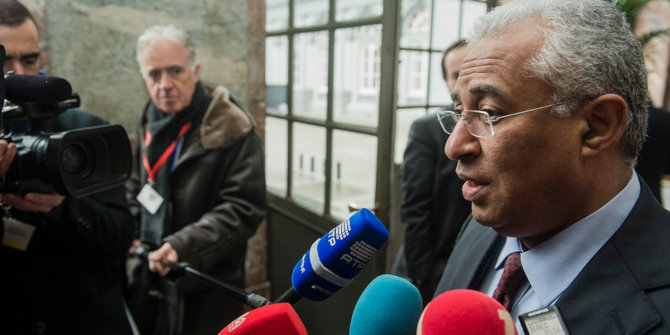

 Following the Eurozone crisis, Spain and Portugal implemented a package of reforms as a condition for receiving financial assistance. But now that left-wing governments are in power in both countries, have these reforms simply been reversed? Drawing on new research, Catherine Moury, Daniel Cardoso and Angie Gago write that several reforms have indeed been reversed, but this has occurred mainly in specific cases where there were perceived electoral benefits for the government. This underlines the profound and durable effects that reforms linked to bailouts can have.
Following the Eurozone crisis, Spain and Portugal implemented a package of reforms as a condition for receiving financial assistance. But now that left-wing governments are in power in both countries, have these reforms simply been reversed? Drawing on new research, Catherine Moury, Daniel Cardoso and Angie Gago write that several reforms have indeed been reversed, but this has occurred mainly in specific cases where there were perceived electoral benefits for the government. This underlines the profound and durable effects that reforms linked to bailouts can have.
The left-wing coalition in power in Portugal since 2015 is often presented as ‘living proof’ that the austerity policies adopted during the bailout can be reverted without negative economic consequences. This seems to indicate that conditionality does not resist partisan turnover – not a good thing from the international lenders’ perspective. But is it really true? To what extent do new governments revert what has been done under conditionality?
Policy reversals in Spain and Portugal
In a recent study, we have assessed this for the cases of Spain and Portugal. Both countries were under much constraint to reform and they were both bailed-out. The Memorandum of Understanding (MoU) in Spain only covered the financial sector, but the European Commission started a parallel programme of strict monitoring and surveillance of fiscal consolidation measures and structural reforms – linking compliance to disbursement of the loan. In 2014, Spain and Portugal exited the bailout programmes; and after this were under the excessive deficit procedure (Portugal exited in May 2017 and Spain in June 2019). In both countries, there were partisan turnovers: the left governed at the beginning of the financial crisis, was succeeded by the right, and is back in power today.
We looked at the 93 major reforms passed under conditionality and calculated that almost half (46) of those measures were reverted after the programme termination. For example, in both countries, the salaries, working hours and holidays of civil servants have been mostly re-installed to the pre-crisis level. This shows that despite the continuation of some external constraint (the excessive debt procedure for example), Southern European states have been enjoying some room for manoeuvre to disrupt what had been done during the bail outs.

António Costa, Prime Minister of Portugal, Credit: PES Communications (CC BY-NC-SA 2.0)
Nevertheless, if we distinguish structural reforms – such as reforms of the labour code, services competition, justice, and the banking sector – from other reforms, the vast majority (81%) of the those reforms remain, despite partisan turnover. For example, with regard to the labour code, the changes introduced by the Portuguese Socialist government are relatively minor and, although there are now negotiations with social partners in Spain, the Socialist Minister for the Economy recently declared that her government would only introduce ‘a few adjustments’.
Moreover, a return to the status quo ante does not mean the reforms lacked impact. For instance, salaries that had been cut and frozen for 5-6 years, then gradually increased; are still lower than they would have been if they had been increasing with inflation. It is also worth observing that Spanish and Portuguese policy-makers were committed to European rules: reversals were allowed by the fiscal space from growth and the decrease of interest rates, but they were also often compensated by other taxes, spending and investment cuts that were less visible. In particular, the Portuguese Socialist government reverted many spending cuts in the first years of its mandate but kept, despite this increase, spending in education and health below pre-crisis levels.
When did the Spanish and Portuguese governments reverse policies?
Reversals can be explained by multiple factors. First, although in both countries the right-wing government reverted some measures as soon as the programme terminated (to the dissatisfaction of lenders), the left reverted twice as many measures as the right. Our analysis indicated that if business groups lobbied for a reversal (and the costs to society were not salient), it would occur. For example, in Portugal, employers asked for representativeness criteria for the extension of collective bargaining agreements to be changed back and this was indeed reverted by the centre-right government as soon as the programme terminated.
We also found that most reversals (90%) were those that visibly concentrated benefits and diffuse costs. For instance, civil servants and pensioners benefited from many reversals, while VAT tax increases, which are diffuse and less visible, were often kept. Hence, partisanship, electoral calculations and vested interests all matter in explaining reversals.
All this shows that, despite policy alternation, bail outs have profound and durable effects. Reversals occur in specific areas only, which are purposefully visible and electorally rewarding. As such, policy reversals allow governments to gain credit for relatively limited change.
Please read our comments policy before commenting.
Note: This article gives the views of the authors, not the position of EUROPP – European Politics and Policy or the London School of Economics.
_________________________________
 Catherine Moury –NOVA School of Social Sciences and Humanities
Catherine Moury –NOVA School of Social Sciences and Humanities
Catherine Moury is a Senior Lecturer in Political Science at the NOVA School of Social Sciences and Humanities. She is the (co) author of four books on Governments and the European Union.
 Daniel Cardoso – NOVA School of Social Sciences and Humanities
Daniel Cardoso – NOVA School of Social Sciences and Humanities
Daniel Cardoso a Postdoctoral fellow at the NOVA School of Social Sciences and Humanities. He holds a PhD from the Free University of Berlin and Fudan University, Shanghai.
 Angie Gago – University of Lausanne
Angie Gago – University of Lausanne
Angie Gago is a Postdoctoral fellow at the University of Lausanne. She has a PhD in Political Studies (University of Milan) and she holds a Masters in International Relations (London Metropolitan University) and a Master’s in Politics and Democracy (UNED).






From the Spanish colony of Catalonia I can only agree.
The truth is that all governments know it is isn’t a good use of money to pay for bloated public services. If you could scratch all services and start them again overnight they would be more efficient. Over time you end up paying for schemes that don’t make sense, paying for employees who have ceased to be productive, paying for departments that only exist because it’s in someone’s political interest for them to exist. Most governments know this but they can’t do anything because politically it’s impossible. To think that just because a government is “left wing” it doesn’t also have an interest in making services more efficient is just wrong.
A bailout forces the government’s hand. It also can do a lot of harm by scrapping things that are of value. But after that is done the next government isn’t going to come in and reverse it all, they will build on what’s happened and do something else.